interview by Michael McCarthy
I’ve known singer/songwriter/painter Michael Rider for several years now. Their piano-centric indie pop blends irresistible pop hooks with thought-provoking lyrics that sometimes feel like poems and occasionally sound like journal entries, which I mean in the best way possible. Insightful is the first word to describe Michael that came to mind when I sat down to write this introduction, being that their words are always exploding with keen observations either about themself or the world around them. On the song “American Fighter,” one of my favorites, they sing, “They call me an American fighter / But that’s not my name / I stand as a ruthless tiger / But it’s not in my nature.” I thought it was an intriguing song when he released it back in 2014 but it feels like it has so much more meaning in light of everything going on in the world today. “Stop this now I’m not having fun anymore,” the song continues. “Stop this crowd / They’re shooting me down to the ground.” Yeah, I’d say it feels timely. Speaking of which, during the following interview we discuss everything from the pandemic to racism and black lives matter along with Michael’s music and artwork.
MM: First of all, how are you holding up with the pandemic?
MR: I’m doing very good. I’m trying to see this pandemic as having as much opportunity as it can have. Obviously, there are a lot of obstacles, but I think that whenever there is darkness there is treasure and I think that this is just the product of kind of a broken system that we’ve been in for a while and I think that it’s really good to have to actually be confronted with these truths and not have to bypass them. Or not having the liberties to bypass them, which we tend to do under normal circumstances. So, I’ve been actually very fruitful. I started to learn how to record myself, which is something I’ve never done before. And I’m working on an album right now so I did some work on that by myself instead of with producers. So, I’m just trying to be self-sufficient and something I’m learning. And probably the whole world is learning. When there’s a lack of real leadership we kind of all have to be self-sufficient in some capacity.
MM: Yeah, I definitely think there’s a leadership vacuum here in the United States right now. I think we agree on that.
MR: [Laughs] Yes, it’s a crazy time. I’m really excited about the future, but it’s a really sad thing to see so many people with their livelihood taken away and then all the people that have passed away because of this virus. So, it definitely comes at a cost for sure, but hopefully, we can learn from it.
MM: In your newsletter, you mentioned that you migrated from New York back to your home state of Virginia to take refuge from the pandemic in March. What point were we at with the pandemic when you left New York?
MR: It was March 9th when I came home. March 9th is actually the day that my nephew was born. My brother’s baby. So, I was coming home for that. I guess it was that week after that. It was too soon to see how big of a situation it would eventually turn into in New York, but it was probably the next week I had a really big release show for my last single, “Run Deep,” and I was planning on coming back to New York and playing this big show so it was a huge decision to stay in Virginia and it took a lot of conversations with family to figure out that I should hold my horses and stay.
MM: So, it wasn’t something you wanted to do so much as something you felt like you had to do to play it safe?
MR: Yeah. When you’re an artist and you’re kind of at the limbs at the mercy of the world you have to take counsel in the people around you, your family. I certainly wanted to go back at the time but my family was very adamant about having me stay and that being a good idea. Also, as an artist, there’s not a lot of stability everywhere, but let alone coming back home I didn’t think I would have any kind of stability at all because I work and live in New York. That’s been my livelihood ever since I’ve been in school. It’s just been a few years, but going back to the safety of being in the dark and trying to be fruitful you have to have an open mind and just think about the possibilities.
MM: So, have you been back to New York at all since early March?
MR: No, I haven’t. I’m going back tomorrow.
MM: Do you still have a place there?
MR: Yes, I still have a place there. I have been paying rent the whole time because I have a lot of art and things there so I had to make sure it was all taken care of.
MM: Do you have any pets waiting for you there?
MR: [Laughs] I wish. No, I don’t. I have two plants so I’m very grateful to be pretty close to my landlord so she was able to water my plants for me, which is good. Yeah, my life is too turbulent to have a dog or a cat, but I would love to one day.
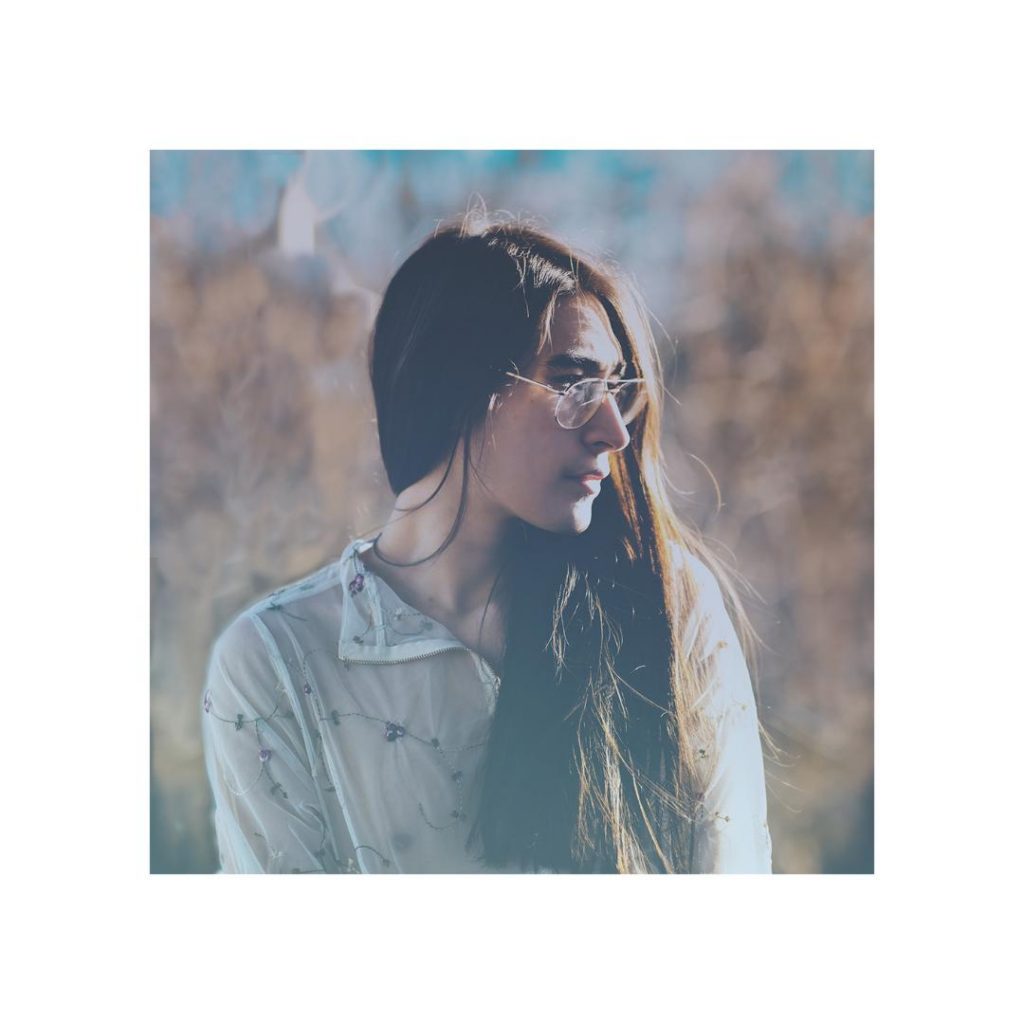
MM: When you decided to stay in Virginia in March, had Trump gone on TV yet and said we should stay home for that first 14-day chunk of time or had that not even happened yet?
MR: No, I’m pretty sure that Trump was giving orders probably the first week that I decided to stay. It was that week before that I had a ticket to come back to New York. I just had no idea and nobody else knew so it was just kind of a gut feeling.
MM: I’m sure as the news played out and New York became the epicenter of the outbreak you must have felt relieved that you decided not to go back.
MR: Yeah, that part was actually really tough. Because I was leaving a lot of the people that I love in New York. The way that these cities work, I’m sure you know that these aren’t just people that are your friends these are people that you work with and that you make money with and that you hang out with. So, I definitely felt like I was leaving them behind. And now with black lives matter and all of these things politically that have risen we have to just think about things like privilege, too. I have been very privileged to be able to stay and have family that allowed me to stay in a place that’s safe.
MM: It’s true. A lot of people probably would’ve liked to have escaped New York City for a few months who didn’t have the luxury to. Whereabouts in Virginia have you been staying?
MR: I am in Short Pump, Virginia, which is a suburb probably about 20 minutes outside of Richmond. So, close to central Virginia.
MM: Is that more like a city area then or out in the country?
MR: This is like right in the middle, I would say. There’s still a lot of greenery and nature, but it’s populated enough where there’s a lot of facilities and there’s kind of cookie-cutter houses.
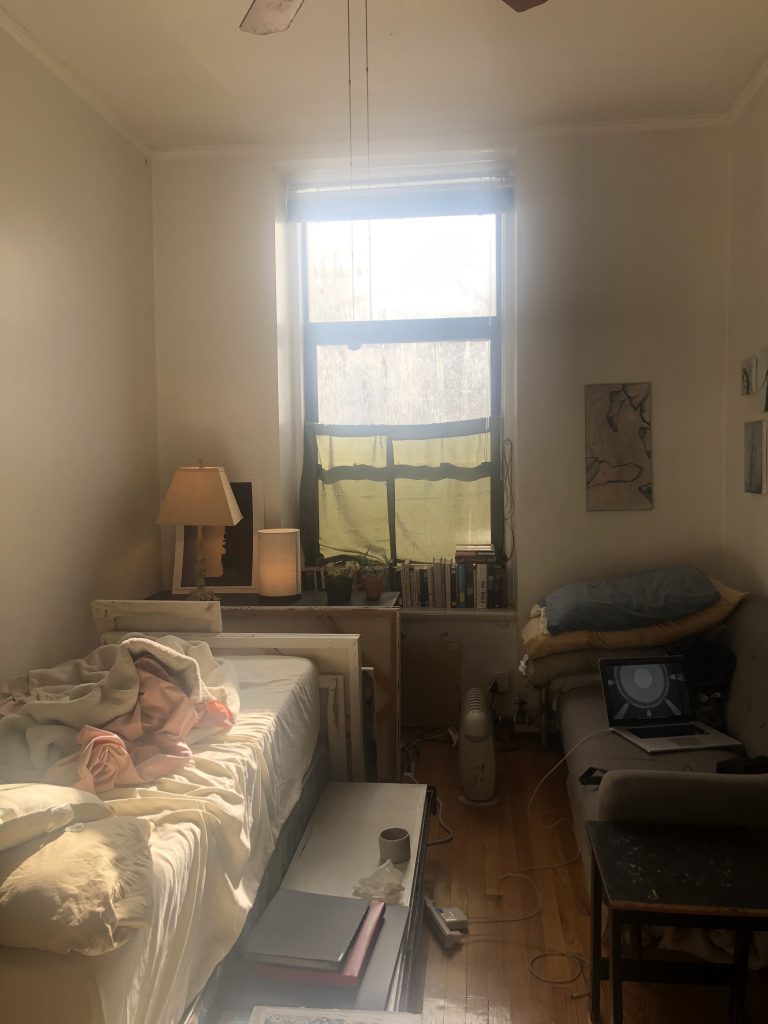
MM: Do you miss city life a lot?
MR: Well, I’ve always loved being out in nature. I’ve actually grown really accustomed to [it]. I do, of course, love New York. But New York is a lot less natural for me to be in. I’m definitely more of a nature person than a city person.
MM: You did your Quiet Trees series of paintings since you have been back in Virginia. What was the inspiration for the series? Did you paint them from your imagination or were they trees that were growing around you there?
MR: All the trees are from my imagination. The trees come from an idea of a self-portrait but also from the idea of where I’ve come from. Specifically, my high school teacher made trees and I was very inspired by her work. Her name is Mary Scurlock. Whenever I paint trees, it’s an idea of continuing the self-portrait, but also paying respects to Mary Scurlock.
MM: So, you see yourself as a tree in that respect?
MR: I think so. Probably not so much the image and what it stands for, but I think the way that I process making trees, the way that I draw paint or draw them or not draw them, I think that has a semblance to a way that I’m feeling at the time so therefore it becomes a self-portrait.
MM: They’re sort of like visualizations of where you’re at emotionally at the time?
MR: Yeah, exactly. And I know that for this series specifically because I’ve done a lot of trees but these trees were very immediate and they’re a bit messy. They’re not as refined. And I think that goes to the feeling of not knowing what was going to happen next. Feeling very uncertain about the future. I made them all the second or third night that I was in Virginia. I made them in a couple nights. It probably wasn’t the best frame of mind but it was the most authentic and I felt like I really needed to have a catharsis and use this energy that I was feeling.
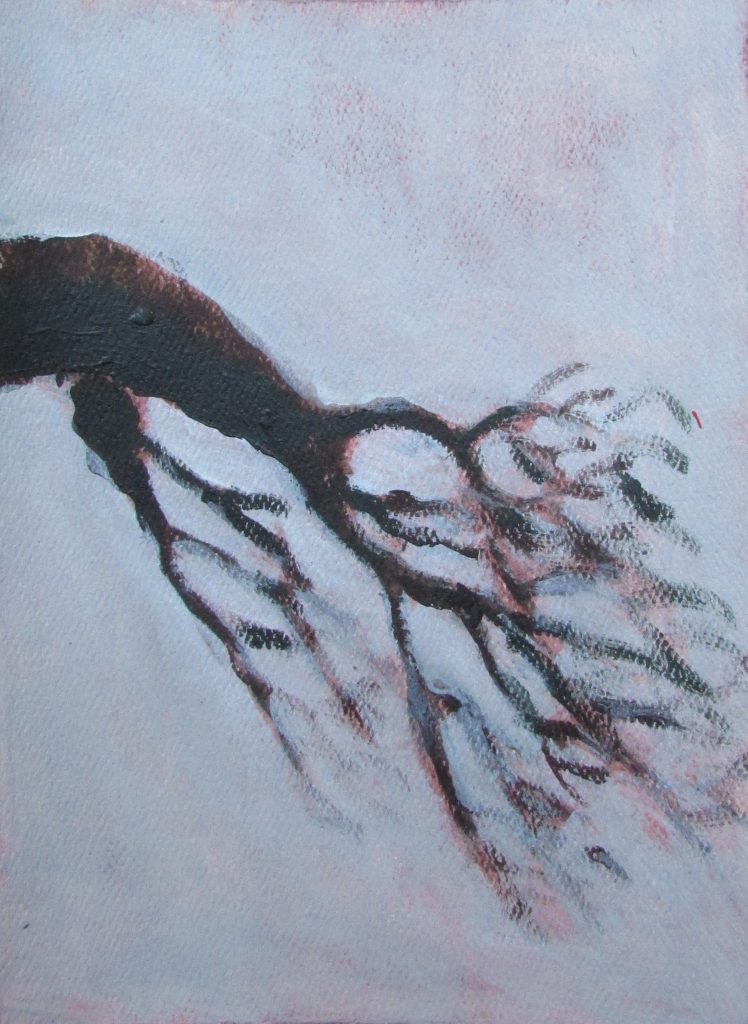
7.5″ x 5.5″ inches
2020
acrylic on paper
MM: Have you done any other painting while you’ve been in Virginia?
MR: Yeah, I actually was doing a lot of painting. I actually have a piano here as well, but my brother, who I was living with, works at home during the day and, obviously, he’s working at home because of the pandemic. So, I didn’t want to use the piano. I was actually painting a lot, which is something that I don’t usually do. Whenever I have free time, I will typically write, which is on piano. Aside from practicing on piano and singing. So, I don’t usually have that much time to paint. But I was able to get that time. Aside from the Quiet Trees, I worked on a series called Figments of the Imagination, which is a series about finishing work that was unfinished from my high school. A lot of this time, why it was so magical, is that I was able to have a lot of closure. I graduated from high school and I went straight to college then I was living in New York and I didn’t really get time to go through my childhood things and to make light of it. Not only was I able to go through these things, I was able to be inspired and to finish them, which was really exciting. And it’s funny now that I’m looking back on that series, Figments of the Imagination, and I feel like they’re still incomplete so I’ll probably continue to work on them. I’m taking some pieces back to New York.
MM: Were they things you had sketched but not actually painted from years ago or something like that? Tell me the story of one of the works in terms of how it started and the state that it’s in now.
MR: Well, all of the paintings had already been worked on. There were already images on all of the paintings. And, really, I could have said that all of them were done. But I wanted to push them. And since I was much older than when they were finished I could improve upon them. And I liked this idea that I was having a collaboration with my younger self. A lot of the paintings were pretty crude in the sense that they have stencils of ex-boyfriend’s names. I kept a lot of these stencils of ex-boyfriend’s names from making birthday cards and things. So, I used these rudimentary stencils and that was kind of a mark of them. It was also just looking at these ex-boyfriends and making these weird forms.
MM: When we did the e-mail interview about your song “Capital,” you said that money was all one could think about in New York City. Was that a way of thinking that you yourself found yourself falling into or was that more of a summarization of people in general?
MR: That’s a really good question. I would say it’s both, I think. Yeah, I think that it can be really exhilarating to live in New York and I think the longer you live in New York the more savvy of an individual [you become] and you get used to that part. But I don’t think money is everything by any means. And the idea that anybody can get money, it’s really just a matter of I don’t want to say the word sacrificing, but that kind of comes to mind. I think the more you sacrifice in a sense the more that you can get. Money also has a lot of strange powers. It can also do a lot of good, too. But, yeah, I think New York is very money-obsessed and I think for the darkest parts of the mind and also for the most beneficial and humanitarian because, of course, there’s also a lot of good people. So, I think money is a big force and, yeah, there are a lot of extremes. I’m still a young person so I don’t have too many years of seeing the world, but I feel that there’s a strange way of thinking about money these days because there just is a lack of money. And, I still believe in that. And we have the one percent and I think most of the people reading your work will know.
MM: You mention the one percent. I just watched a documentary series on Netflix called Jeffrey Epstein: Filthy Rich. What a sick, sick person this guy was. And the things that he got away with, I mean, it’s unbelievable. It makes you wonder what else people in the one percent are getting away with and they just haven’t been caught yet.
MR: It’s crazy. It’s a crazy game. It’s sad. It’s pretty scary. Money can definitely be used for very dark things.
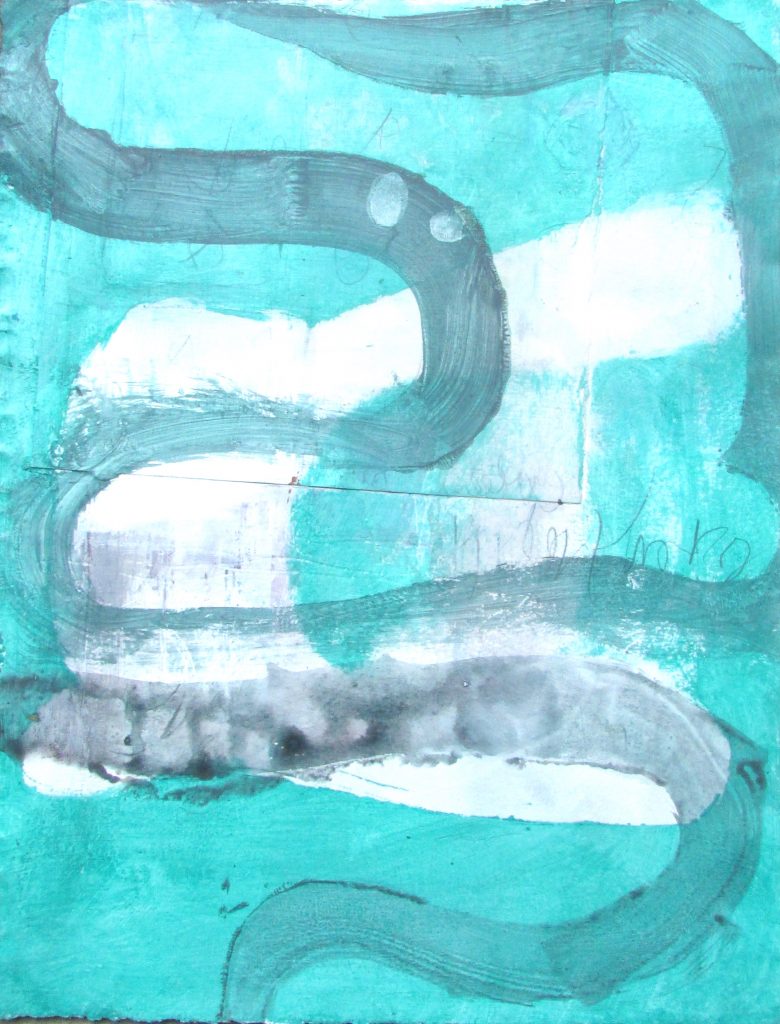
13″ x 10″ inches
acrylic on paper
2020
MM: When you go back to New York, I’m sure a lot of things are going to be different. What are you the most curious about?
MR: I’m a homebody. I’m a maternal homebody. I’m like the studio artist to the max. So, I love being at home. I have a huge compendium of sources and music and objects and things at home that inspire me. So, I’m really excited to go back and see those things and be in my space again. But the most important thing is being able to play music all the time again, which I’ve been having a huge hunger for. My brother has been really kind to have me in his house but I’m looking forward to being able to play again. To not have to worry about interrupting someone’s day to day.
MM: Have you heard about any big changes in New York that you’re dreading? I guess the subways will be pretty different now and things like that.
MR: Yeah, there are definitely quite a bit of changes. The subways have an end time during the evening. There’s a time when they don’t run. There’s obviously protective gear that is mandated in the city.
MM: Like masks.
MR: Masks, et cetera. Which I would’ve been doing anyway. It’s obviously more imperative to wear a mask when you go outside because when I go outside in Virginia I don’t have a mask, obviously, but in New York I would. And also one of the great things about New York is that when you’re in New York you don’t live in a solitary home where your neighbors are so far. You’re intimate with your neighbors and the people that live in your community. You have to work with them.
MM: That could be why the virus spreads so rapidly there, though.
MR: Yeah. I think New York is such a wonderful place and, obviously, it’s been hit really hard but I know that there are a lot of good things that are happening with the people. New York, as I said, is a very communal place. And I think New Yorkers just want to help each other out. One good thing that I’ve been hearing is that at seven o’clock all the people kind of clap outside their windows for all of the essential workers and I think that’s such a beautiful way to uplift the city. The amazing city.
MM: I’m sure it will be interesting to see where things are at with the protests, too. As of today, we’re 21 days into the protests and they’re still going strong.
MR: Yeah.
MM: Are you looking forward to that or are you intimidated by that at all?
MR: I’m also very lucky to not have any roommates. I live by myself in New York. I’m not taking care of anybody. I obviously wouldn’t want to be reckless. I’d take all of the precautions. But it’s just me. So, I’m really excited to see what’s going on and join those protests and be along those people. However, I do think there are more ways to protest than just being out there physically. People can obviously educate themselves and donate and tell people about it.
MM: I know you’re donating the money raised from the sale of your Quiet Trees series to black lives matter or related charities. Speaking of which, one question that I’m always asking people that I haven’t asked you yet is if someone was giving you a million dollars to go to charity and it all had to go to the same charity or cause, which would you give it to and why?
MR: Oh my gosh.
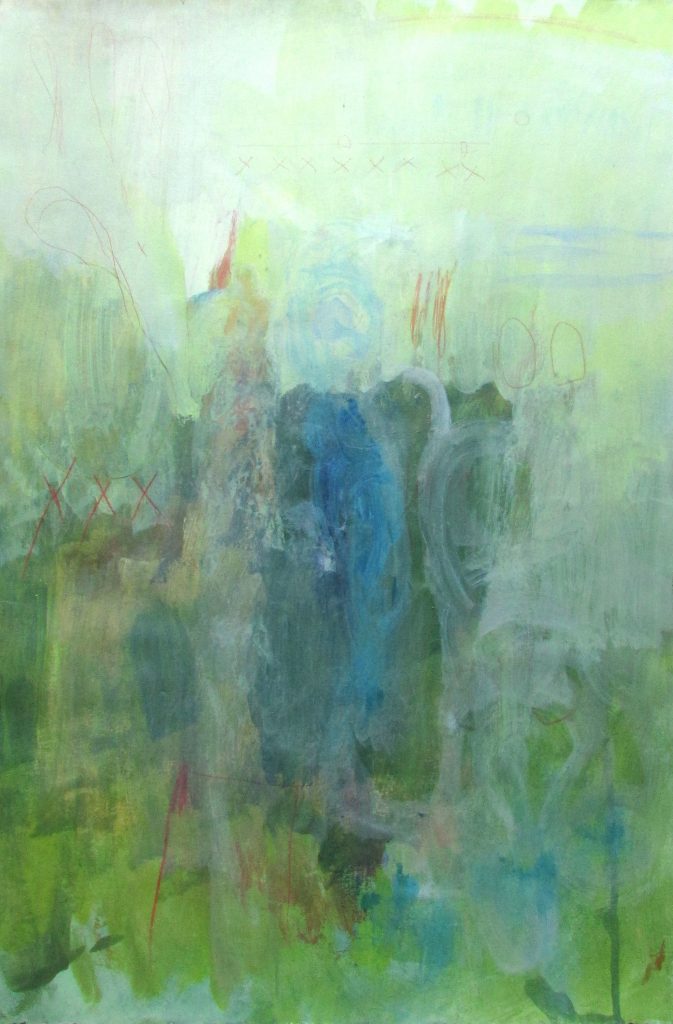
22″ x 15″ inches
acrylic on paper
2020
MM: It all has to go to the same one. That’s the question.
MR: There are so many good ones. [Pauses] That’s just a hard one. It’s so split. Part of me is big on environmental things and obviously, the LGBTQ and, also, one thing that has really come to light when this whole pandemic hit is stability for artists, too. I feel like we need to have more organizations that support artists. But, also, undocumented immigrants as well because a lot of the population isn’t getting anything from the circumstances.
MM: Yeah, they’re not getting any stimulus payments or loans or anything.
MR: Yeah, right, right. It’s a hard place to be. Oh my gosh, I’m not sure where I would put the million dollars to.
MM: That’s OK. We’ll just print your answer like this that way you get to address a few things.
MR: OK, cool.
MM: What’s your opinion of how Democratic governor Ralph Northam has been doing in Virginia?
MR: Uh, you know, to be honest, I’m haven’t been following the news as much as I should. [Laughs] I will say that I don’t think things should’ve been opened this early. I think that we should’ve waited a couple of… However, I do like the notion on the election that’s going to be happening. That there’s going to be more accessibility with absentee ballots. I actually just got a letter in the mail from the DMV in Virginia explaining the absentee process, which is something that I haven’t gotten before. It’s always a lot more difficult and challenging to enroll in absentee. I vote physically in New York but I vote for Virginia via absentee. But I will say that I think things should’ve been opening a lot later. I think they opened too early.

MM: I feel the same about here in Massachusetts.
MR: And I think that the protests have been handled with a lot of sensibility. There are little things I wish we could do more. I’m all about taking down the monuments and I’m all about the protests, obviously, so I wish there was more that could’ve been done, but I think that Virginia has treated the protests with a lot of sensibility, which is good.
MM: They want to rename a lot of military bases that are currently named after generals from the Civil War who fought in favor of slavery and President Trump so far is refusing to even consider that, much to the dismay of most people in the world. What are your thoughts on that?
MR: Yeah, I think that as we get older and we have more perspective on events, I think that history should constantly be reassessed and to, I don’t know, I don’t know if edited is the right word, but we always need as much perspective as possible and I think we should uproot things that don’t work in our society. Going back to visiting Richmond and seeing these monuments that aren’t there anymore, there’s a bunch of graffiti and names that have taken the place of these big monuments and I think it’s such a beautiful symbol of democracy and that the people have spoken.
MM: And I imagine that eventually, they’ll change the names of these military bases. A bunch of generals have spoken up against Trump and I think he’s feeling pretty unwanted right now and I’m quite happy about that.
MR: [Laughs] Yeah, I guess members of his cabinet are finally coming out of the woodwork and talking about how much of a monster he is.
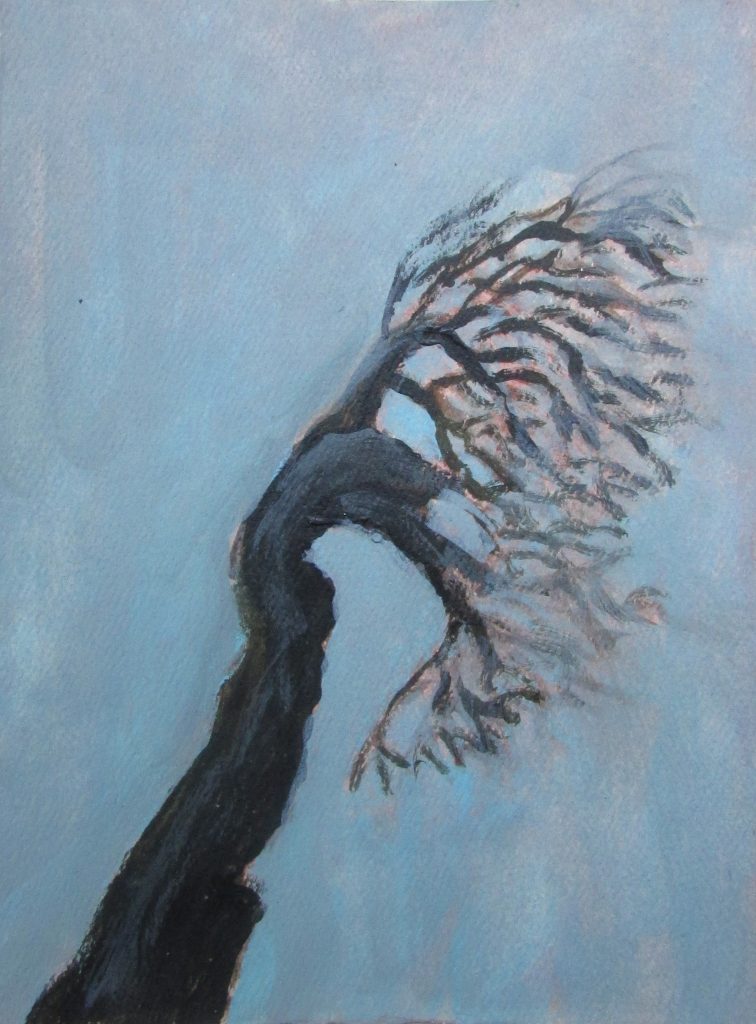
7.5″ x 5.5″ inches
2020
MM: It’s too bad black lives matter isn’t calling for his resignation.
MR: Yeah.
MM: But I don’t think people will demand that he resign until the election.
MR: Yeah, it’s a scary time. I don’t know why I get this feeling – well, I do know why I get this feeling, but there are a lot of people that are very afraid of him that are working underneath him and I think there are a lot of forces that are also backing him up, which is kind of a scary thing. Not even people but a kind of culture.
MM: It’s definitely scary.
MR: It is. I don’t know how to compare it because I’m young. But all I know is this, this sense of the media being its own entity and it’s a strange place and you don’t know what to believe. Of course, there has been violence at these protests, however, a lot of this violence is allegedly from white supremacists and some undercover cops supposedly. There are so many forces at play. It’s hard to keep track of.
MM: Yeah, it seems a lot of people don’t want the protests to go well so they keep sending in people to create interference.
MR: Yeah.
MM: What does black lives matter mean to you?
MR: I’ve learned a lot about myself and what I am willing to tolerate and accept and if I’m not going to stand up for something then I am going to fall for it and I’m going to be a victim of it and I know that as a non-binary person, a gay person, and somebody that is a minority, I haven’t been there to the extremes of what a black person would go through in America, but I can certainly empathize with the movement a bit. I know what it’s like for people to look at you with a certain kind of lense. I’ve had to do a lot of reflection upon being sensitive. I think that for my own self I’m not as PC as a lot of my friends in New York are and I think that I have more of a sense of humor I would say, but these times have made me look at my language and my perspective and taking what I say a lot more seriously and my thoughts a lot more seriously. Racism is incredibly rooted in everything and it’s a process that we have to confront. Because if we don’t confront it then it’s just going to continue. It’s not going to be something that we fix tomorrow. It’s gonna be something that we have to constantly be reanalyzing and I think at the end of the day we have to look at our black neighbors. I grew up with black best friends. My best friend was named Bret and I just think about him and what he’s going through. He was somebody that I was very close with and to think about him and what he has gone through in his life is something that I recognize in myself. We’re all the same. We just have to stand up not just for black people but for everybody. If we can’t stand up for them then we can’t stand up for part of ourselves.
MM: I believe today there was actually a march specifically for black trans kids. I think that was in Seattle. And also today the Supreme Court said you can’t discriminate based on sex and this applies also if the person is trans now. So, that’s certainly a positive thing.
MR: Yes, I was very happy to hear about that.
MM: You said you describe yourself as non-binary?
MR: Non-binary, yes. I also identify as being gay as well. I also identify as transfeminine but I’m also gender nonindifferent, going back to the idea of having a sense of humor I do have a certain kind. Actually, before all of this, I had a sense of humor, but after this I feel like I need to be more forthcoming about how I identify. And what I’m willing to stand for, like I was saying.
MM: Are there any organizations or charities that you would like to give a shout out to?
MR: Well, first and foremost, I have sent a donation to George Floyd’s family. I think that was a huge one. I think that not only are reparations should be made but I think that I couldn’t see a better advocate for black lives matter than his family. I think we’re gonna see good work come out of George Floyd’s family. I have a list here.
MM: If it’s easier to e-mail it to me and have me stick it in there, that’s fine, too.
MR: OK, that’s a good idea. That might be good because there are quite a few so I probably should. I’ll probably do that. And, obviously, as well, Brianna Taylor, her story is quite traumatic. I like giving back to the families of the victims. So, yeah, Brianna Taylor is another one as well. But I will send you a full list.
Black lives matters organizations/charities/donations:
George Floyd gofundme:
https://www.gofundme.com/f/georgefloyd
Breonna Taylor gofundme:
https://www.gofundme.com/f/9v4q2-justice-for-breonna-taylor
Trans Women of Color Collective:
Black Lives Matter:
https://secure.actblue.com/donate/ms_blm_homepage_2019
The Bail Project:
Black Table Arts:
http://www.blacktablearts.com/
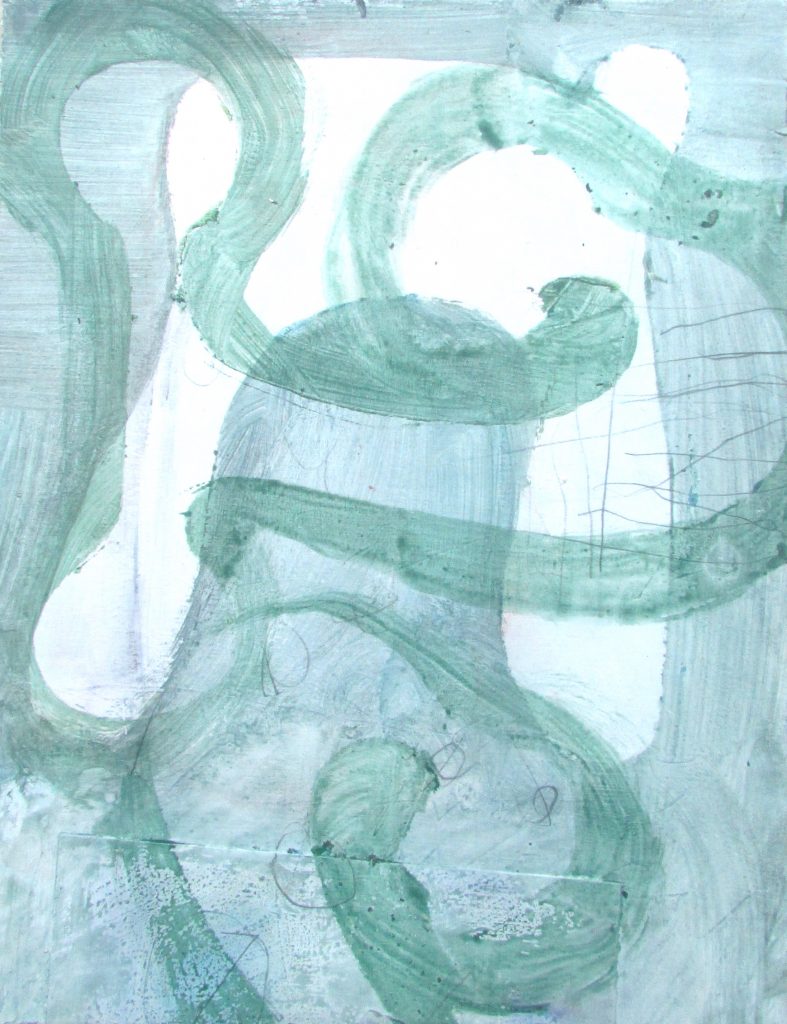
13″ x 10″ inches
acrylic on paper
2020
MM: What positive changes do you hope to see come out of the protests when all is said and done?
MR: I would love to see community-funded law enforcement. I think that would be great. It’s gonna be a huge thing that we have to work on because law enforcement right now is such a deep-rooted, toxic culture. I think that they defend property, they don’t defend everyday people. I think it’s important for law enforcement to be connected with the community and to know what’s going on and to have the community’s best interest. I think that’s good for the morale of everybody. I don’t want to spend a lot of time sympathizing with the police at this time because that’s not what this is about but a lot of these problems are really deep and, also, a lot of these problems are very much connected. It’s a very toxic environment. People find themselves wanting to be in power and I think that’s why a lot of people join the police and I think that’s something that we have to question.
MM: I was reading about how a lot of people who were bullied as kids become cops so they can become the bullies.
MR: Yeah, it’s not a good place for that. It’s a very, I don’t know, toxic masculine culture and it’s very fratty. It’s unfortunate.
MM: It’s interesting for me because being a white guy – and having privilege as they say – until seeing things like George Floyd and some of these other things recently I never realized how bad it was.
MR: It’s very strange. It’s a terrible climate, obviously. And there have been things like sexual harassment that have come out of the police. We all have a certain way that we know police are thinking when they look at us. It’s hard to be a woman in society in general but I know that there are a lot of conditions [with how] police view women. Not obviously all the police, but there’s a lot of sexual harassment that has circulated because of the police as well.
MM: I do feel bad for the good cops who are trying to do the best they can within the system and trying to make things better and now all of a sudden the whole world is against them. That kind of sucks.
MR: Yeah, I’m sure it’s not easy at all.
MM: There are even a lot of African American police. How are they supposed to feel now, putting on the uniform? How are their brothers and sisters going to view them now that there’s this big anti-police movement?
MR: Yeah, that’s actually a really good point. I haven’t really thought about [that].
MM: Have you ever personally been the victim of discrimination of any sort?
MR: Yes, yeah, for sure. From other people, absolutely. I was going to say that I don’t know if that has been the case with police but I have come into contact with police and I’m sure I have gotten certain treatment because I’m white or I’m whiter. My mom is from Mexico so I like to say that I’m a little brown.
MM: Were you bullied at all, growing up?
MR: Yeah, I was bullied in middle school. There was a group of boys. Well, one boy in particular, who ended up actually being gay. He used to throw erasers at me in math class. There were a few math classes where I was really bullied like that. Other than that, it was kind of like light gossip and talking. Obviously, when you’re gay, people talk about you and make fun of you for being gay when you’re in middle school. But I would say in the grand scheme of things I was never hurt by a bully, which I was very grateful for.
MM: One of the effects of racism in our capitalist society is poverty. When we did an e-mail interview about your song “Capital” you expressed a negative opinion about capitalism, writing that it “ultimately exposes and nearly stands on enslavement of society’s lower classes,” which I think most people who aren’t one percenters would agree with. Do you think racism and capitalism go hand in hand?
MR: Yes, absolutely. America has been enslaving black people since the beginning of this country and we still do til this day. We still do this day. We do ghettoize black people and brown people and racial inequality is alive and very wrong.
MM: In the same interview, you said that consumerism has tainted the way that we make art. Would you say that has impacted how you make art yourself or does being aware of that make you impervious?
MR: Yeah, so consumerism absolutely is something that we have to confront as artists. I think that it’s something that we all think about. We live in a day when there are people that have a huge platform that probably shouldn’t be there and there are also people who have an authentic voice that don’t have any kind of platform whatsoever. It’s a strange thing. I think it’s something that all artists will have to confront.
MM: Do you feel like when you make your art you make decisions on what you think will or won’t prove to be the most financially rewarding?
MR: I think that, yeah, there’s a time where artists have to confront this idea of having their art support them and having to make decisions for that to happen. Being an artist is a beautiful thing it’s also privileged but it’s also very much a job and you have to be able to see it as an enterprise and make decisions regarding it.

MM: If you had to be known primarily for your music or your visual art, which would you prefer to be known for?
MR: Oh my gosh, you know, I would prefer to be known for my music probably. But I’m grateful for people knowing my work at all at this point. When anybody enjoys anything that I put out into the world that’s a huge blessing for me. I will say that I think my paintings are music and I think that in my music I use a lot of practices that are painterly. I do feel like I paint with music and vice versa with the paintings. I imbue the language that is inherent to me as music. As a kid, I used to sing and I find that I see through melody and I see through that kind of movement that can also be transcendent with art but I do love music because you actually have the capacity to legibly tell a story where people are listening.
MM: Your new single “Breakthrough” comes out on the 26th. What can you tell us about it?
MR: “Breakthrough” is a song that I’ve had for a while. I think it’s personally, the song that I’m most proud of on this new album. It’s one of the last to be written for the album. That song is about breaking through and escaping barriers. Self-inflicted barriers and things that we feel comfortable in. Breakthrough is all about searching for a greater love of yourself. It’s the moment before you find great change. For a lot of people close in my life, it was depression. Others suffer in different ways. The window means yourself, in a lot of ways, it means breaking through to yourself, having the strength to confront yourself.
MM: Will there be a music video for “Breakthrough”?
MR: Yes there will be a music video for Breakthrough. There will also be a celebratory release livestream on June 27th at 8pm est on my YouTube!
Special thanks to Michael Rider for taking the time to chat with us!

Leave a Reply to Scott Cofield Cancel reply